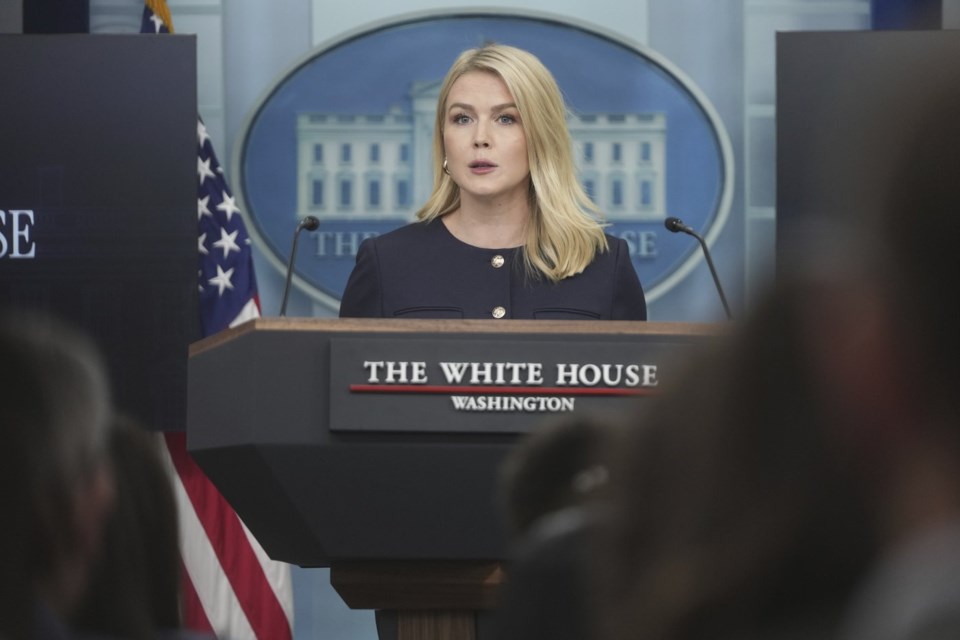WASHINGTON — White House Press Secretary Karoline Leavitt said Tuesday there have been "successes" at the Canada-U.S. border — but offered no new hints about what might convince U.S. President Donald Trump to drop his tariffs on Canada.
"Thanks to President Trump, operational control of the border is becoming a reality and the administration's historic measures are yielding huge results," Leavitt told a press briefing Tuesday.
Leavitt said only 54 people were apprehended last month in the Swanton Sector of the northern border — which includes areas of New Hampshire, Vermont and New York — a 95 per cent drop since March 2024. She said the area is a "main hot spot" that recorded more than 80 per cent of all apprehensions along the northern border during the 2024 fiscal year.
Trump cited the flow of people and fentanyl across the border as the reason for threatening Canada with steep tariffs.
Then-prime minister Justin Trudeau responded to Trump's concerns with boosted border protections late last year. More helicopters and drones were launched and additional officers were tasked with guarding the border. Canada named a new "fentanyl czar," listed Mexican cartels as terrorist groups and launched a Canada-U.S. joint strike force to combat crime.
It's likely that no action by Canada would have stopped Trump from imposing steep tariffs, given the fact that U.S. Customs and Border Protection data shows only a tiny volume of fentanyl is seized at the northern border.
Trump signed an executive order declaring an emergency at the northern border and in March went ahead with the economywide duties against Canada, only to partially pause the levies a few days later for imports compliant with the Canada-U.S.-Mexico Agreement on trade, called CUSMA.
Imports that aren't compliant continue to be hit with 25 per cent tariffs, with a lower 10 per cent levy on energy and potash.
The White House did not respond to emailed questions on Tuesday about whether Leavitt's comments mean any change to the emergency order at the northern border, or to Trump's tariffs.
Markets have been in turmoil since Trump launched his trade war with the world in early April. He implemented "reciprocal" tariffs, only to walk back the most devastating duties a few hours later by putting in place a 90-day pause to negotiate trade deals. The U.S. is still imposing a 10 per cent tariff on most countries, as well as 25 per cent levies on automobile, steel and aluminum imports.
Trump also hit China with 145 per cent tariffs and Beijing countered with 125 per cent duties on U.S. goods.
Trump's team has sent conflicting messages about the president's efforts to realign global trade. Some advisers have said the tariffs are permanent and will fill federal coffers, while others argue the duties are a negotiating tactic.
Later Tuesday, Trump said the U.S. was in a transition period and "it’s going to be a little while." The president added America is "doing well with every country" because "ultimately, we have something they want."
Leavitt said the Trump administration has received 18 proposals from other countries for trade deals. She did not say whether a proposal would be enough to stop the duties as Trump's team attempts to sign new trade deals with much of the world by July.
"There’s a lot of time left and the president's trade team is working again at Trump speed, as quickly as they can, to ensure that these deals can be made," she said.
CUSMA was negotiated during the first Trump administration. At the time, Trump called it the best trade deal ever made.
Prime Minister Mark Carney, who spoke with Trump by phone late last month, has said the president agreed to begin negotiations on a new economic and security agreement after Canada's election.
This report by The Canadian Press was first published April 22, 2025.
Kelly Geraldine Malone, The Canadian Press



